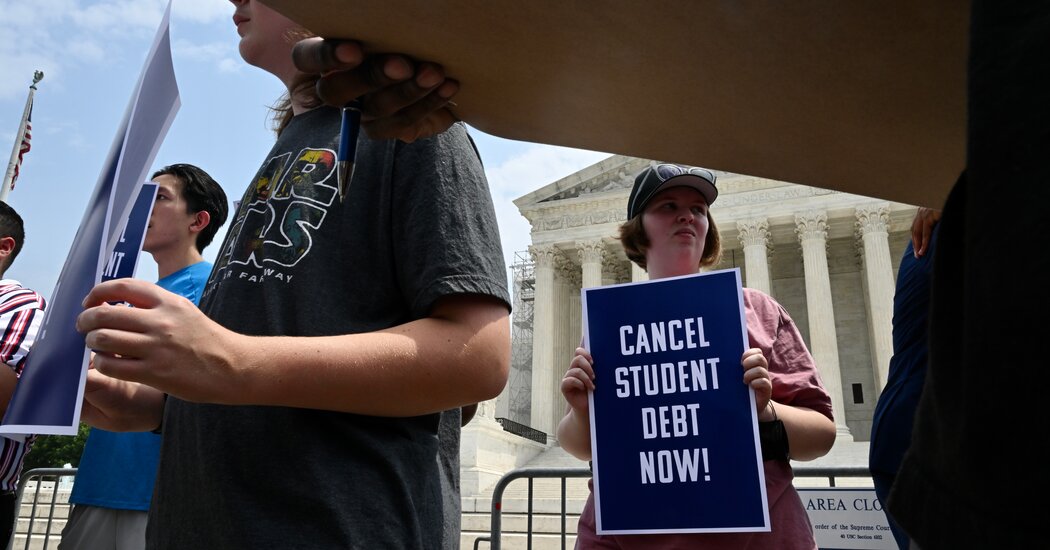Friday’s Supreme Court decision striking down President Biden’s plan to cancel up to $20,000 in federal student loan debt for millions of borrowers wa
Friday’s Supreme Court decision striking down President Biden’s plan to cancel up to $20,000 in federal student loan debt for millions of borrowers was a blow — but not a surprise — to people like Claude Reed, who had hoped to be freed of a debt that has haunted him for decades.
Mr. Reed, who is 74, took out $3,300 in loans in the early 1970s to fund his studies at the University of Wisconsin. He worked for decades as a journalist, musician and fund-raiser for nonprofits, cobbling together a living off what were often low-income jobs. He paid $9,000 on his loans over the years — but interest and fees kept his balances ballooning, preventing him paying off his debt. Now, half a century after his college years, he owes $4,600 — more than he originally borrowed.
Mr. Reed has had his tax refunds garnished to pay the debt, which has at times left him so strapped that he has skipped meals and borrowed money from friends. Mr. Biden’s plan would have eliminated his remaining debt. Now, he faces the prospect of once again having money deducted from his only income stream, Social Security payments.
Mr. Reed, who is Black, sees student debt relief as a racial-justice issue — a framing President Biden has also frequently invoked. Black students are more likely to have to borrow money for college, to borrow more and to carry the debt longer than their white classmates.
“This is like football. Instead of me starting at the 20-yard line, I’m behind in the other end zone, you know?” said Mr. Reed, who lives in Idaho Falls, Idaho.
The court’s decision also dismayed Heather Smith, 34, a newly graduated veterinarian in New Orleans who is earning a low five-figure salary while she completes her residency. She has a six-figure debt bill to pay off. Mr. Biden’s plan would have eliminated the $7,500 in debt from her undergraduate education.
“Every little bit helps,” Dr. Smith said.
Christopher McKinnon kept paying his $728 a month student loan bill during the pandemic pause — which began in March 2020 under former President Donald J. Trump and was extended for more than three years, across two presidential administrations — but he stopped in September, leaving him with a balance of exactly $10,000.
“At first, I was disappointed,” Mr. McKinnon, 36, said about Friday’s decision. “But I think the Supreme Court made it obviously and painfully clear that Congress needs to do something about student loan debt.”
Mr. McKinnon, who lives in East Haddam, Conn., and works in regulatory compliance for the utility industry, borrowed $53,000 for his undergraduate and graduate studies and has since paid back more than $67,000, according to a spreadsheet he keeps to track his debt.
He can afford to restart payments this fall, but it will require cutting back on his family’s monthly budget. “I’m really worried about the economy,” he said. “With rising interest rates, plus federal student loan repayments restarting, I think it’s going to be a pretty grim holiday season for some companies.”
James Weaver, 43, had also paid his loan balance down to almost exactly the amount he would have been eligible to have forgiven: $20,000. (As a former Pell grant recipient, Mr. Weaver qualified for the maximum debt cancellation available under Mr. Biden’s plan.)
Mr. Weaver, who lives in Albuquerque, earned a master’s degree in entomology in 2020 and worked as a federal biologist. He said he anticipated that the Supreme Court would strike down Mr. Biden’s debt cancellation plan.
“I completely understand both sides of the argument,” he said. “You took out the loans, you should pay them back. The problem is, as we all know, education has gotten way more expensive in the last 10, 15 years, than it had been historically.”
Mr. Weaver said he has enough income and savings that restarting payments will not be a serious hardship. “I’m in a position to be able to pay this back, and I will,” he said. “But I’m probably the atypical scenario. Some people will be paying this debt off for their entire life.”
www.nytimes.com
